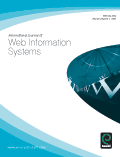
International Journal of Web Information Systems
Scope & Guideline
Fostering collaboration in the world of information systems.
Introduction
Aims and Scopes
- Web Intelligence and Semantic Technologies:
The journal emphasizes the development and application of web intelligence techniques, including semantic web technologies and knowledge graphs, to enhance data interoperability and knowledge discovery. - Machine Learning and Data Mining:
There is a strong focus on machine learning methodologies, particularly in the context of web data analysis, recommendation systems, and predictive modeling, reflecting the growing importance of data-driven decision-making. - Graph-Based Approaches:
Research often employs graph-based models to address complex problems in social networks, recommendation systems, and data relationships, highlighting the significance of graph theory in web information systems. - Distributed and Edge Computing:
The journal explores the implications of distributed systems and edge computing on web information systems, particularly in optimizing performance and resource allocation in various applications. - Security and Privacy in Web Applications:
There is a consistent focus on security frameworks and privacy-preserving methods in web applications, addressing the critical need for safeguarding user data and ensuring secure transactions. - User Engagement and Interaction Design:
Research related to user behavior, engagement, and the design of interactive systems is prevalent, emphasizing the importance of user-centric approaches in web information systems.
Trending and Emerging
- Personalized and Adaptive Systems:
There is a growing trend towards personalized and adaptive systems, especially in e-learning and user interaction contexts, where user data is leveraged to enhance the experience and outcomes. - Reinforcement Learning Applications:
Research on reinforcement learning, particularly in the context of UAVs and autonomous systems, is gaining momentum, showcasing innovative applications in real-world scenarios. - Federated Learning and Privacy-Preserving Techniques:
The rise of federated learning signifies a trend towards privacy-preserving machine learning methods, addressing the need for secure data handling in collaborative settings. - Graph Neural Networks:
The application of graph neural networks for various tasks, including recommendation systems and social network analysis, is emerging as a significant theme, reflecting the utility of graph-based learning. - Cross-Lingual and Multilingual Technologies:
With globalization, there is an increasing focus on cross-lingual and multilingual technologies, particularly in natural language processing and knowledge representation, to cater to diverse user demographics. - Advanced Data Visualization Techniques:
Emerging research is centered around advanced data visualization methods that enhance the interpretability of complex datasets, crucial for decision-making in web information systems.
Declining or Waning
- Traditional Database Management Systems:
Research related to conventional database management techniques has decreased, as newer paradigms such as NoSQL and distributed databases gain traction in the context of web applications. - Static Web Applications:
The focus on static web applications has waned, reflecting a shift towards dynamic, interactive, and responsive web applications that better meet user expectations. - Basic Web Scraping Techniques:
While web scraping remains relevant, simpler techniques have seen a decline in research focus as more sophisticated methods and ethical considerations around data collection come to the forefront. - Legacy Programming Paradigms:
There is less emphasis on traditional programming paradigms for web development, with a noticeable shift towards modern frameworks and languages that support agile and scalable web applications. - Single-Method Approaches:
There has been a decline in the publication of studies that rely on single-method approaches, as interdisciplinary and hybrid methodologies become more favored in web information systems research.
Similar Journals

KNOWLEDGE AND INFORMATION SYSTEMS
Bridging Theory and Practice in Information SystemsKNOWLEDGE AND INFORMATION SYSTEMS, published by SPRINGER LONDON LTD, is a distinguished journal in the field of information systems, artificial intelligence, and human-computer interaction. With its ISSN 0219-1377 and E-ISSN 0219-3116, this journal has built a robust reputation since its inception, featuring a convergence of valuable research from 2005 through 2024. Catering to a diverse academic audience, it is classified among the leading journals in its category, proudly holding a Q1 ranking in Information Systems and Q2 rankings in multiple other domains. The journal aims to publish cutting-edge research that not only advances theoretical understanding but also provides practical applications within these rapidly evolving fields. Although it is not an Open Access journal, subscribers can access a wealth of knowledge critical for researchers, practitioners, and students looking to enhance their expertise. With a 2023 Scopus rank placing it within the 66th percentile for Information Systems, KNOWLEDGE AND INFORMATION SYSTEMS is an invaluable resource for those committed to pushing the frontiers of knowledge in technology and information science.
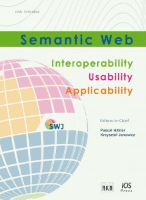
Semantic Web
Leading the Charge in Semantic Web ScholarshipSemantic Web is a leading scholarly journal dedicated to the advancement of research in the area of semantic web technologies and their applications. Published by IOS PRESS, the journal has established itself as a vital resource for scholars and practitioners since its inception in 2010, with a continued focus on fostering interdisciplinary collaboration through its publication of pioneering research in Computer Networks and Communications, Computer Science Applications, and Information Systems. The journal currently holds a prestigious Q2 ranking across these categories and is indexed in Scopus, reflecting its strong academic impact with rankings in the top 20% of its field. Although the journal operates under a subscription model, it remains committed to disseminating high-quality research that addresses contemporary issues in the semantic web domain. As the field continues to evolve, Semantic Web seeks to facilitate innovation, collaboration, and the development of standards, making it an essential outlet for researchers, professionals, and students keen on exploring the transformative potential of semantic technologies.

ICT Express
Fostering Global Collaboration in Computational SciencesICT Express is a leading open-access journal published by Elsevier that has established itself at the forefront of the fields of Artificial Intelligence, Computer Networks and Communications, Hardware and Architecture, Information Systems, and Software. Since its inception in 2015, this South Korea-based journal has provided a vital platform for disseminating innovative research and practical applications across these rapidly evolving domains. With an impressive impact factor and consistently high Scopus rankings—placing it in the top quartiles of its categories—it attracts contributions from both seasoned experts and emerging scholars. Current access options ensure that groundbreaking findings are readily available to a global audience, thus fostering collaboration and advancement in technology and computational sciences. As ICT continues to reshape various industries, the significance of research published in ICT Express is crucial for staying ahead in the digital landscape.
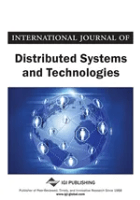
International Journal of Distributed Systems and Technologies
Pioneering Research in Computer Networks and Architecture.Welcome to the International Journal of Distributed Systems and Technologies, a prominent academic platform published by IGI Global dedicated to advancing the field of distributed systems and technologies. With an ISSN of 1947-3532 and an E-ISSN of 1947-3540, this journal, established in 2010 and continuing through 2024, offers a unique venue for researchers, professionals, and students to disseminate their findings in the realms of computer networks, communications, hardware, and architecture. Despite its current placement in the Q4 quartile for both computer networks and communications and hardware and architecture categories in 2023, the journal is committed to fostering innovative solutions and interdisciplinary collaboration that can drive future advancements. Although not open access, contributions to this journal not only receive rigorous peer review but also have the potential to significantly impact the community, underscored by a focus on applicable research that addresses the emerging challenges in technology. As part of a rich repository, the journal invites you to explore its latest issues and join in shaping the future of distributed systems.

Journal of Biomedical Semantics
Unlocking Insights Through Semantic InnovationThe Journal of Biomedical Semantics is a prestigious open-access journal published by BMC since 2010, dedicated to advancing the field of biomedical informatics through the lens of semantics. With an ISSN of 2041-1480, this journal caters to an international audience from its base in the United Kingdom. It focuses on the convergence of computer science, health informatics, and information systems, providing a vital platform for innovative research and knowledge dissemination. The journal is ranked in the second and third quartiles across several relevant categories in 2023, including Q2 in Computer Networks and Communications and Q3 in both Computer Science Applications and Health Informatics. With Scopus rankings highlighting its relevance in various subfields, this journal serves as a critical resource for researchers, professionals, and students alike, promoting high-quality, peer-reviewed articles on topics encompassing advanced computational methods and semantic technologies in healthcare. As a fully open-access resource, it ensures broad accessibility of groundbreaking research findings, making vital contributions to the ever-evolving landscape of biomedical semantics.
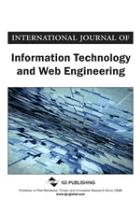
International Journal of Information Technology and Web Engineering
Bridging Theory and Practice in IT and Web EngineeringInternational Journal of Information Technology and Web Engineering, published by IGI GLOBAL, is a pivotal platform for the dissemination of cutting-edge research in the fields of information technology and web engineering. With its ISSN 1554-1045 and E-ISSN 1554-1053, this journal has been effectively contributing to the academic landscape since its inception in 2006, aiming to bridge theoretical frameworks and practical applications in an increasingly digital world. As a recognized Q3 journal in the realm of Computer Science (miscellaneous), it ranks 122 out of 232 in Scopus' classification, positioning it amidst the active discussions and developments within the IT and web engineering communities. The journal not only serves as an invaluable resource for researchers and educators but also encourages students and practitioners to explore innovative methodologies and technologies that shape the future of the digital landscape. Although it is not currently an open-access journal, its contributions are indispensable for advancing knowledge and fostering collaboration within the global research community.

JOURNAL OF INTELLIGENT INFORMATION SYSTEMS
Exploring Innovations in Information TechnologyThe Journal of Intelligent Information Systems, published by Springer since 1992, is a premier academic journal that offers a multidisciplinary platform in the fields of Artificial Intelligence, Computer Networks and Communications, Hardware and Architecture, Information Systems, and Software. With an impressive impact reflected in its 2023 Q2 category rankings across multiple domains and a commendable standing in the Scopus Rankings—ranking #84 in Computer Networks and Communications and #101 in Artificial Intelligence—the journal is recognized for its contribution to advancing knowledge and innovation. Although it is not an open-access journal, its accessibility through institutional subscriptions ensures that a wide range of researchers, professionals, and students can engage with high-quality, peer-reviewed research that addresses the latest advancements and trends in intelligent systems. For over three decades, this journal has effectively bridged gaps between academia and industry, making it a vital resource for those aiming to push boundaries in intelligent information systems.

JOURNAL OF SUPERCOMPUTING
Elevating Knowledge in Hardware and ArchitectureJOURNAL OF SUPERCOMPUTING is a premier academic journal published by SPRINGER, situated in the Netherlands, that has made significant contributions to the fields of computer science, particularly in hardware and architecture, information systems, software, and theoretical computer science. With a robust publication history spanning from 1987 to 2024, this journal has cultivated a strong reputation, evidenced by its Category Quartiles ranking in the Q2 category across multiple relevant domains in 2023. The journal's Scopus rankings further underscore its influence, boasting a 78th percentile in mathematics and theoretical computer science, revealing the high quality of research disseminated within its pages. As vital discourse unfolds in the realm of supercomputing—where innovative techniques and technologies rapidly evolve—this journal serves as a crucial platform for researchers, professionals, and students to explore cutting-edge studies and build upon the foundations of knowledge in this dynamic field.
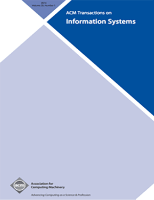
ACM TRANSACTIONS ON INFORMATION SYSTEMS
Transforming Challenges into Solutions in Information SystemsACM Transactions on Information Systems, published by the Association for Computing Machinery, serves as a leading forum for the dissemination of high-quality research in the domain of information systems. With an impact factor consistently placing it in the prestigious Q1 quartile across multiple categories including Business, Management and Accounting, Computer Science Applications, and Information Systems, this journal has established itself as a key resource for researchers, practitioners, and students seeking to advance their understanding of information systems. The journal encompasses a broad scope, featuring innovative methodologies, theoretical advancements, and practical applications that address contemporary challenges in the field. Although it does not currently provide open access options, the insights shared within its pages significantly contribute to shaping academic discourse and promoting best practices in the evolving landscape of information systems. With its impressive Scopus rankings, ACM Transactions on Information Systems remains at the forefront of scholarly communication, encouraging rigorous inquiry and collaboration.

Human-centric Computing and Information Sciences
Unlocking Potential in Human-Computer InteractionHuman-centric Computing and Information Sciences, published by the Korea Information Processing Society, represents a leading platform in the field of computer science, particularly focusing on the interaction between humans and computational systems. With an impressive Q1 ranking in the 2023 category of Computer Science (miscellaneous) and a commendable Scopus rank of #14/232 (94th percentile), this journal has established itself as a cornerstone for researchers and practitioners dedicated to advancing understanding in this vital area. Understanding the significance of making technology more accessible and effective for users, the journal has been an Open Access publication since 2011, promoting wide dissemination of knowledge without barriers. The journal's scope encompasses innovative methodologies, user experience design, and the integration of human factors into computing environments, making it essential reading for anyone interested in the intersection of technology and society. With all articles freely accessible, the journal not only contributes to scholarly discourse but also encourages collaboration among researchers worldwide, fostering further advancements in human-centric computing.